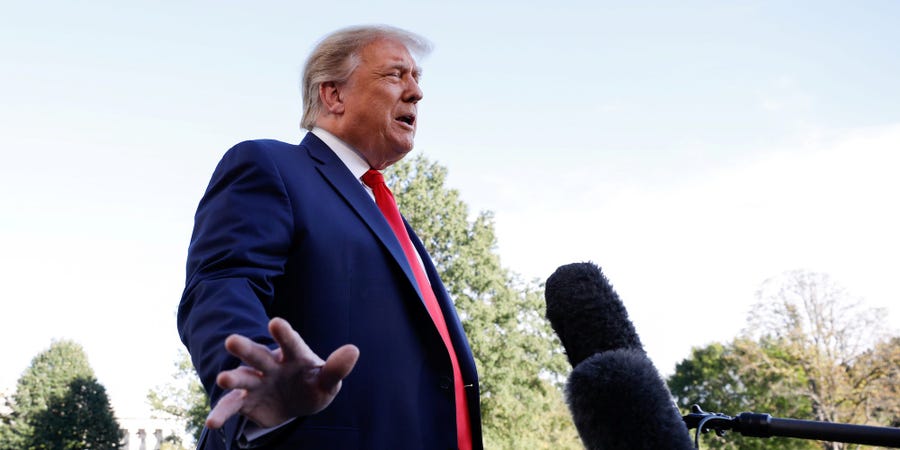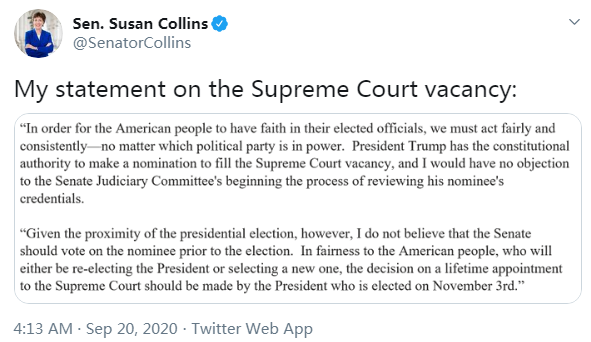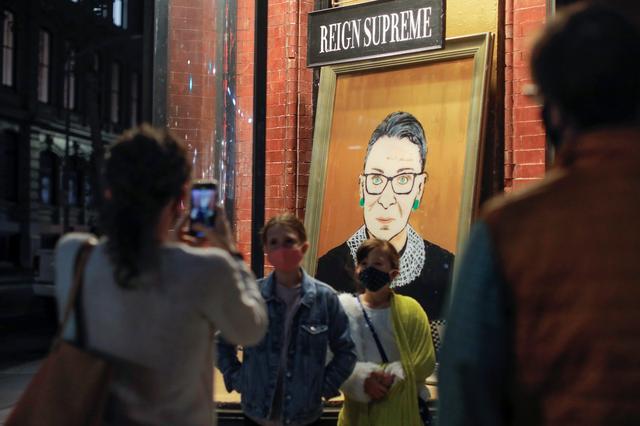U.S. President Donald Trump vowed Saturday to nominate a successor, likely a woman, to replace late Supreme Court Justice Ruth Bader Ginsburg "very soon."
Ginsburg's death on Friday from cancer after 27 years on the court handed Trump, who is seeking reelection on November 3, the opportunity to expand its conservative majority to 6-3 at a time of a gaping political divide in America.
"We will have a nominee very soon," he told reporters in Washington, adding: "Most likely it would be a woman."
Only two female justices remain on the court: Elena Kagan and Sonia Sotomayor, both progressives appointed by former President Barack Obama.

President Donald Trump speaks to the media on the South Lawn of the White House in Washington, DC, U.S., September 19, 2020. /Reuters
President Donald Trump speaks to the media on the South Lawn of the White House in Washington, DC, U.S., September 19, 2020. /Reuters
"We want to respect the process and the process will move, I think it's going to move quickly actually," Trump said.
"We were put in this position of power and importance to make decisions for the people who so proudly elected us, the most important of which has long been considered to be the selection of United States Supreme Court Justices," the Republican president earlier said on Twitter. "We have this obligation, without delay!"
The second female Supreme Court justice in U.S. history and a champion for equal protection under law for women, Ginsburg was nominated to the bench by then President Bill Clinton in 1993 and over the years became the most senior liberal justice on the nation's highest court.
The Supreme Court said a private interment will be held at the Arlington National Cemetery, without revealing the specific date for the ceremony.

Associate Justice Ruth Bader Ginsburg is seen seated (2nd R) in the front row of a group photo of the U.S. Supreme Court's nine Justices. Prior to Ginsburg's death, the U.S. Supreme Court was made up of nine Justices: one Chief Justice and eight Associate Justices. /supremecourt.gov
Associate Justice Ruth Bader Ginsburg is seen seated (2nd R) in the front row of a group photo of the U.S. Supreme Court's nine Justices. Prior to Ginsburg's death, the U.S. Supreme Court was made up of nine Justices: one Chief Justice and eight Associate Justices. /supremecourt.gov
New battle in Capitol Hill
The death of Ginsburg set up a fierce partisan fight on Capitol Hill over whether to confirm a nominee less than 50 days away from the presidential election.
Any nomination would require approval in the Senate, where Mr. Trump's Republicans hold a 53-47 majority.
Democratic lawmakers led by Senate Minority Leader Chuck Schumer, and Democratic presidential nominee Joe Biden as well as former President Barack Obama, all maintained that Ginsburg's replacement be nominated by the next president to be chosen by voters in the November 3 election.
"The voters should pick the president, and the president should pick the justice for the Senate to consider," Biden said Friday night.

People mourn the passing of U.S. Supreme Court Justice Ruth Bader Ginsburg in front of the U.S. Supreme Court in Washington, DC, the United States, September 18, 2020. /Xinhua
People mourn the passing of U.S. Supreme Court Justice Ruth Bader Ginsburg in front of the U.S. Supreme Court in Washington, DC, the United States, September 18, 2020. /Xinhua
Such a position echoed Ginsburg's dying wish. "My most fervent wish is that I will not be replaced until a new president is installed," she said in a statement dictated to her granddaughter, Clara Spera.
On the Republican side, however, Senate Majority Leader Mitch McConnell, who blocked a Senate hearing of an Obama appointee shortly ahead of the 2016 election to replace late Justice Antonin Scalia who died in February that year, said Friday that the Senate will vote on Trump's nominee to fill the vacancy Ginsburg left.
Republican Senator Ted Cruz of Texas, who is on Trump's list of potential Supreme Court nominees announced on September 9, said Friday the president should tap a new justice "next week."
Not all Republican senators supported the move: Maine's Susan Collins on Saturday said Mr. Trump should hold off on nominating.

U.S. Senator Susan Collins's tweet/ Twitter screenshot.
U.S. Senator Susan Collins's tweet/ Twitter screenshot.
"In fairness to the American people, who will either be re-electing the President or selecting a new one, the decision on a lifetime appointment to the Supreme Court should be made by the President who is elected on November 3rd," said Collins, who is facing a tough re-election race herself, on Twitter.
Democrats are still seething over the Republican Senate's refusal to act on Obama's Supreme Court nominee, Merrick Garland, in 2016 after conservative Justice Antonin Scalia died 10 months before that election. Senate Majority Leader Mitch McConnell said then that the Senate should not act on a court nominee during an election year, a stance he has since reversed.
Even if Democrats win the White House and a Senate majority in the November election, Trump and McConnell have time as the full new Congress would not be sworn in until January 3.
Senior congressional Democrats raised the prospect of adding additional justices next year to counterbalance Trump's nominees if they win control of the White House and Senate in the November election.

Children are photographed in front of a painting in a storefront on Broadway of Associate Justice of the Supreme Court of the United States Ruth Bader Ginsburg who passed away in Manhattan, New York City, U.S., September 18, 2020. /Reuters
Children are photographed in front of a painting in a storefront on Broadway of Associate Justice of the Supreme Court of the United States Ruth Bader Ginsburg who passed away in Manhattan, New York City, U.S., September 18, 2020. /Reuters
Who will succeed Ginsburg?
Trump, who now has a chance to nominate a third justice to a lifetime appointment on the court named Barbara Lagoa of the Atlanta-based 11th Circuit and Amy Coney Barrett of the Chicago-based 7th Circuit as possible nominees.
Lagoa has served on the 11th U.S. Circuit Court of Appeals for less than a year after being appointed by Trump and confirmed by the Senate on an 80-15 vote. Prior to that she also spent less than a year in her previous position as the first Latina to serve on the Florida Supreme Court. She previously spent more than a decade as a judge on an intermediate appeals court in Florida.
Barrett has generated perhaps the most interest in conservative circles. A devout Roman Catholic, she was a legal scholar at Notre Dame Law School in Indiana before Trump appointed her to the 7th Circuit in 2017. A Barrett nomination would likely ignite controversy, as her strong conservative religious views have prompted abortion-rights groups to say that if confirmed by the U.S. Senate, she would likely vote to overturn the landmark 1973 Roe v. Wade Supreme Court decision that legalized abortion nationwide.

A combination photo of Barbara Lagoa (L) and Amy Coney Barrett (R). /Reuters
A combination photo of Barbara Lagoa (L) and Amy Coney Barrett (R). /Reuters
Joan Larsen could also be a potential candidate, who sits on the federal appeals court in Cincinnati, Ohio. She has developed a reputation as a solid conservative, opposed to the extension of gay rights and having taken a tough stance on treatment of prisoner.
For male candidates, Amul Thapar, Thomas Hardiman and Raymond Kethledge are names considered among the favorites.
Even before Ginsburg's death, Trump had made public a list of potential nominees. Thapar is one of them. He was a district court judge in Kentucky – the first federal judge of South Asian descent – before Trump appointed him to the Cincinnati-based 6th Circuit in 2017.
Hardiman, as federal appeals court judge in Pittsburgh, Pennsylvania, has drawn attention by arguing, among other things, that the First Amendment to the U.S. Constitution would not authorize citizens to film police officers. The former Republican activist seen as solidly conservative, he has served alongside Trump's sister, Judge Maryanne Trump Barry, who reportedly has recommended him to her brother.
Kethledge, a 53-year-old judge originally appointed by George W. Bush, now serves on the federal appeals court for the Sixth Circuit, which includes the Great Lakes state. He is a fervent defender of free enterprise and individual rights and is considered a judicial originalist.
Republican senators Ted Cruz, Tom Cotton and Josh Hawley are also on Trump's list of candidates. Were he to nominate one of them the choice would be seen as more political than choosing a sitting judge.
(With input from agencies)